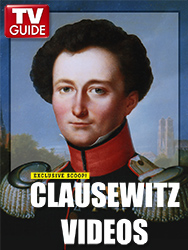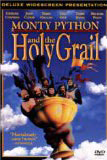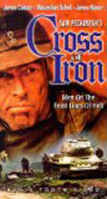
Fifty+ videos making reference to Clausewitz are listed in the 7-page "Clausewitz Videos" section. Some of these have actual educational value—in too many cases, unfortunately, by demonstrating common misunderstandings. Others are merely amusing. They are listed in no particular order of importance.
|
THIS PAGE This is a guide to some pop-culture references to Clausewitz that might be useful bits for lectures or presentations—especially if you are looking to fulfill the U.S. War Colleges' mandatory "Monty Python video requirement" for discussions on strategic theory. — • — |
|
ADDITIONAL PAGES Academic Lectures and Interviews by Prominent Clausewitz Scholars |
|
Clausewitz at the Pentagon, 2015 In 2015, then-Under Secretary of Defense for Personnel and Readiness Brad R. Carson invited several prominent Clausewitz scholars to give a series of lectures, which culminated in a panel discussion involving Carsion and six of the series participants. We have 4 full-length classes by individual speakers and the full panel discussion. |
|
Clausewitz's writing were not intended to become doctrine, but they are certainly relevant to doctrine. Explaining the relevance can be done well or poorly. |
POTENTIALLY USEFUL VIDEO PROVOCATIONS
Return to Main Videos Page
● Excerpt from film Crimson Tide (1995). The content is a little bit debatable (but we've never seen anything on Clausewitz that wasn't debatable) in the theoretical argument scene between Gene Hackman and Denzel Washington. When used it at the National War College as a prelude to seminar, it always sparked things off. You have to watch it closely—we think it's a valid analysis, but there are some tricks in it. For instance, Clausewitz does not argue that the commander who ignores the political issues is the one most likely to win. But he does make an argument in very similar language that the opponent who considers his objectives to be worth a higher price has an advantage—which was obviously the case in, say, Vietnam.
 ● there's a commercial film made in 1959, starring Jeff Chandler and Fess Parker: The Jayhawkers, a sort of cloak-and-dagger western about the guerrilla war in "Bleeding" Kansas before the Civil War. It has an amusing breakfast-table scene in which Clausewitz and Jomini are mentioned. That makes a nice filmclip for "Americanizing" the subject, but otherwise it's content-free and the film itself is wildly inaccurate, historically speaking. (We don't have this clip.)
● there's a commercial film made in 1959, starring Jeff Chandler and Fess Parker: The Jayhawkers, a sort of cloak-and-dagger western about the guerrilla war in "Bleeding" Kansas before the Civil War. It has an amusing breakfast-table scene in which Clausewitz and Jomini are mentioned. That makes a nice filmclip for "Americanizing" the subject, but otherwise it's content-free and the film itself is wildly inaccurate, historically speaking. (We don't have this clip.)
 ● Paul Schmelzer reports that he saw/heard a reference to Clausewitz on the '50s Western TV show "Bronco." The bad guy (a former Union Officer turned bank robber) described Bronco as possessing what Clausewitz called "a genius for War," and tried to hire him for his gang, which robbed banks with military precision. (We don't have this clip.)
● Paul Schmelzer reports that he saw/heard a reference to Clausewitz on the '50s Western TV show "Bronco." The bad guy (a former Union Officer turned bank robber) described Bronco as possessing what Clausewitz called "a genius for War," and tried to hire him for his gang, which robbed banks with military precision. (We don't have this clip.)
 ● Gerard Butler's character in the 20-09 movie "Law Abiding Citizen" makes amusing reference—largely meaningless, but so what?—to Carl von Clausewitz. (Click link or image to view video.)
● Gerard Butler's character in the 20-09 movie "Law Abiding Citizen" makes amusing reference—largely meaningless, but so what?—to Carl von Clausewitz. (Click link or image to view video.)
 ● The "Black Knight" scene in Monty Python and the Holy Grail is useful as an illustration of Clausewitz's discussion of limited political and/or military objectives, the military objective of leaving one's opponent "disarmed," and the problem of will versus capacity. Using it also fulfils the mandatory "Monty Python video requirement" for War College lectures. (Click link or image to view video.)
● The "Black Knight" scene in Monty Python and the Holy Grail is useful as an illustration of Clausewitz's discussion of limited political and/or military objectives, the military objective of leaving one's opponent "disarmed," and the problem of will versus capacity. Using it also fulfils the mandatory "Monty Python video requirement" for War College lectures. (Click link or image to view video.)
 ● This Lays Potato Chip commercial is a good illustration of the "ends/means" problem in strategy. SecDef Donald Rumsfeld evidently did not see this video prior to the invasion of Iraq. Source/origins unknown. We apologize for the graphic violence. (Click link or image to view video.)
● This Lays Potato Chip commercial is a good illustration of the "ends/means" problem in strategy. SecDef Donald Rumsfeld evidently did not see this video prior to the invasion of Iraq. Source/origins unknown. We apologize for the graphic violence. (Click link or image to view video.)
 ● This short clip from Sam Peckinpah's "Cross of Iron" shows troops discussing Clausewitz on the Eastern Front in WWII. (Click link or image to view.) Clausewitz, however, did not say "State policy"—he simply said Politik. (Click link or image to view video.)
● This short clip from Sam Peckinpah's "Cross of Iron" shows troops discussing Clausewitz on the Eastern Front in WWII. (Click link or image to view.) Clausewitz, however, did not say "State policy"—he simply said Politik. (Click link or image to view video.)
